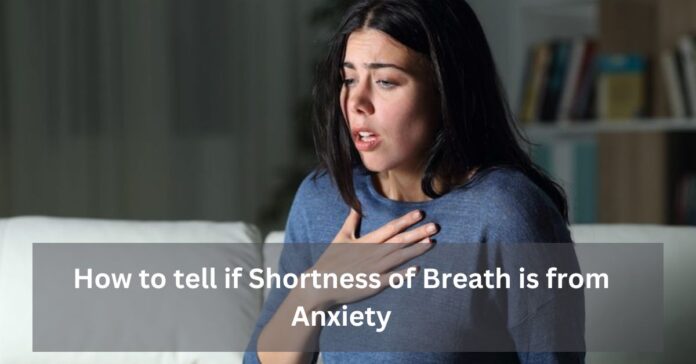Shortness of breath frequently occurs as a typical symptom of anxiety. While this may be worrisome, it is important to note that it is harmless and subsides once the anxiety diminishes.
Experiencing shortness of breath can intensify feelings of anxiety, leading individuals to believe they are encountering a respiratory or cardiac issue when they actually have symptoms related to anxiety.
This article delves into the correlation between anxiety and shortness of breath, medically known as dyspnea. It also explores how to tell if shortness of breath is from anxiety
What causes shortness of breath is from anxiety?
Anxiety and panic are closely linked to fear, and they can trigger both behavioral and physiological adaptations that help individuals defend themselves against perceived threats.
When confronted with a fearful situation, the brain initiates a fight-or-flight response. This response entails an accelerated heart rate, which pumps blood to the organs more rapidly, preparing the muscles for action.
Furthermore, the body responds by increasing the pace of breathing, facilitating the delivery of additional oxygen to the muscles. As a consequence, this can lead to the experience of shortness of breath.
How to tell if Shortness of Breath is from Anxiety
Distinguishing between symptoms caused by anxiety and those stemming from other health conditions can be challenging when individuals are experiencing anxiety, particularly if the symptoms are severe.
Shortness of breath is among the symptoms that individuals with anxiety may encounter, although it is important to note that not everyone with anxiety will necessarily have breathing difficulties.
Anxiety can give rise to various physical and psychological symptoms, which may include:
- Dry mouth
- Elevated heart rate
- Dizziness
- Sweating
- Chills
- Nausea
- Diarrhoea
- Trembling or shaking
- Muscle tension
- Rapid breathing
- Chest pain
- Restlessness
- Difficulty focusing
- Confusion
- Impaired memory
- Speech difficulties
Anxiety disorders
When individuals experience long-lasting or severe anxiety symptoms, a medical professional may diagnose them with various specific anxiety disorders. These may include:
- Generalized anxiety disorder
- Social anxiety disorder
- Separation anxiety disorder
- Agoraphobia
- Specific phobias
- Panic disorder
RELATED: How to naturally increase testosterone
Treatments
In order to alleviate short-term anxiety symptoms, including shortness of breath, healthcare professionals may prescribe benzodiazepine medications. These may include:
Alprazolam (Xanax)
Clonazepam (Klonopin)
Diazepam (Valium)
Lorazepam (Ativan)
These medications can provide relief from anxiety symptoms within approximately 30 minutes. However, it is important to note that benzodiazepines can have adverse effects. In 2020, the Food and Drug Administration (FDA) strengthened its warning about the potential risks of benzodiazepines, including physical dependence and life-threatening withdrawal symptoms. Combining benzodiazepines with alcohol, opioids, or other substances can be fatal. It is crucial to follow a doctor’s instructions when using these medications.
Selective serotonin reuptake inhibitors (SSRIs), commonly referred to as antidepressants, may also be prescribed by doctors to address anxiety symptoms.
Cognitive behavioural therapy (CBT) is another treatment approach that can benefit many individuals with anxiety. It focuses on modifying thoughts and behaviours related to anxiety-triggering situations. CBT helps individuals recognize and cope with anxiety-inducing conditions instead of avoiding them. Psychodynamic psychotherapy is an effective treatment option for anxiety as well. It emphasises the role of interpersonal and familial conflicts in relation to anxiety symptoms. This therapy leverages the patient-therapist relationship to foster personal reflection, acceptance of difficult emotions, and engagement in new behaviours.
When to See a doctor?
Individuals who suspect they may have an anxiety or panic disorder can greatly benefit from consulting with a healthcare professional to discuss their symptoms and explore potential treatment options.
If attempts to restore normal breathing patterns through breathing exercises and relaxation techniques prove ineffective, it may be necessary to seek medical attention.
Frequent or persistent shortness of breath could be indicative of an underlying medical condition, such as:
Asthma
Obesity
Chronic obstructive pulmonary disease (COPD)
Interstitial lung disease
Heart problems
Conclusion
Shortness of breath caused by anxiety or panic can create a cycle where increased anxiety worsens breathing difficulties.
Healthcare professionals commonly suggest relaxation techniques and diaphragmatic breathing to alleviate various anxiety symptoms, including shortness of breath.
In some cases, individuals may find temporary relief by using medications to manage their anxiety symptoms. For chronic anxiety and panic, a combination of medication and psychotherapy may be recommended.
I hope you liked our article on how to tell if shortness of breath is from anxiety, if you have any comments or suggestions do share them in the comments below.
If you want to get knowledge about how to tell if shortness of breath is from anxiety through video, then watch the complete video given below:-
FAQ
Q1: What are common symptoms of anxiety?
Ans: Common symptoms of anxiety include shortness of breath, increased heart rate, and excessive worry.
Q2: How can anxiety affect breathing?
Ans: Anxiety can lead to rapid breathing, causing shortness of breath and difficulty breathing.
Q3: What are treatment options for anxiety?
Ans: Treatment options for anxiety include medications, therapy (such as CBT), and relaxation techniques.
Q4: When should I seek medical attention for shortness of breath?
Ans: Seek medical attention if shortness of breath is frequent, severe, or accompanied by chest pain or other concerning symptoms.





